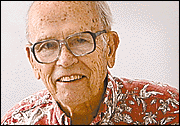Advertisement - Click to support our sponsors.


Hawaii’s World
A talk with Sen. Daniel K. Inouye always is interesting and informative, probably news-making. Inouye will seek
eighth Senate termFirst | Second | Third of three articles
My recent 80 minutes with him at his office on the seventh floor of the Prince Kuhio Federal Building were all of the above, enough so that I will devote three of my regular column slots -- today, plus next Tuesday and Thursday -- to telling you about it.
The headlines first:
No. 1 -- He will become an occasional lecturer at the University of Hawaii, probably starting in the 2000-01 academic year.
No. 2 -- He will "absolutely" (with the qualification "health permitting") run for an eighth term in the U.S. Senate in 2004, even though he will turn 80 that Sept. 7.
No. 3 -- He will work "as hard as I have ever worked" to help the Hawaii congressional delegation win enactment by October of a Hawaiian status bill -- a very fast speed in our usually slow-paced Congress.
All of these are great news to me, because he has so much to tell as a lecturer and does it so well, and because he is far and away Hawaii's most powerful member of Congress and will only gain status as his seniority grows. He has been there all the years since statehood in 1959 and in the Senate since 1963.
Headlines Nos. 1 and 2 are interlinked. He told me some years ago he might retire at 80 to fulfill his desire to be a college professor in his remaining years.
President Kenneth Mortimer of the University of Hawaii has told him he can lecture without retiring from the Senate and can start on an "as available" basis starting this fall.
He will schedule lectures for periods when Congress normally is in recess. His range of possible topics is immense.
I first learned that he is a world-class podium master at the stormy Democratic National Convention in 1968 during the Vietnam War. He delivered a resonant keynote speech, then took the podium as temporary chairman and held the delegates in order before they broke loose under the permanent chairman, the then-speaker of the House.
The mechanics of his UH relationship remain to be worked out, but it will be a golden opportunity for those students to hear an insider's perspective on some of the most dramatic episodes in recent American history.
He chaired the committee investigating the Iran-Contra affair, served on the Watergate Committee, which recommended impeachment of President Nixon, and was Senate intelligence chairman for a number of years. He also was co-chairman of the commission to build the Franklin D. Roosevelt Memorial, which opened in 1997 in Washington, D.C. It is as big a crowd-drawer as the Lincoln Memorial.
Inouye wrote an autobiography, "Journey to Washington," in 1967. It had seven printings but there will be no successor. He says he has decided book-writing is like doing "the Dance of the Seven Veils." You remove a few veils with no hesitation for most audiences but each additional removal gets more personal -- with the last saved only for God.
To write a very frank book would offend too many people. Thus, he will leave that job to historians. They can mine a lode even richer and much more nationally significant than that of Hawaii's beloved Gov. John A. Burns, recently the subject of many posthumous tributes.
Had Inouye retired from the Senate when he was around 65 he might have resumed the practice of law, but thinks his use to a law firm at 80 would be only that of a "rainmaker" to bring in business.
A.A. Smyser is the contributing editor
and former editor of the the Star-Bulletin
His column runs Tuesday and Thursday.